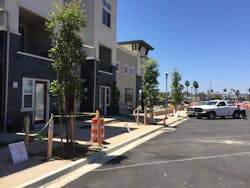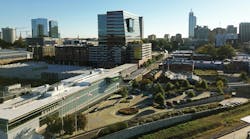About the author: Katie Peeler is marketing coordinator for DeepRoot Green Infrastructure LLC. Peeler can be reached at [email protected] or 415.746.1580.
San Marcos, a small city in the North County region of San Diego County, Calif., now stands out as a distinct, regionally identifiable city with its own light rail public transit system and is home to several colleges and universities. Recently, San Marcos has focused attention and resources on retrofitting select parts of the city to make them more pedestrian- and cyclist-friendly, especially in areas close to transportation and education hubs, such as those surrounding light rail sprinter stations and close to local colleges and universities.
Complete Street Project
Armorlite Drive, a strip of heavily trafficked road about a third of a mile long just north of State Route 78, recently was targeted by the city as a location for a total road overhaul to create a “Complete Street.” The $2-million project was supported primarily by a San Diego Assn. of Governments Smart Growth grant. A Complete Street is defined by Smart Growth America as a street designed and operated to enable safe access for all users regardless of age, ability or mode of transportation. Complete Streets make it easier for people to cross the street and to walk and bike safely to their destinations and transport hubs. They also improve equity, safety and public health, while reducing transportation costs and traffic woes.
The Armorlite Complete Street project introduced raised 8-ft-wide bike lanes, 10-ft-wide sidewalks for outdoor cafes and dining, bike racks, angled and parallel parking spaces, street trees, and other green landscape enhancements to the street. It is particularly significant as a transit-oriented project given its close proximity to the Palomar sprinter (light rail) station and Palomar College. Storm water management also was a major focus of the project.
The suspended pavement system supports the weight of the sidewalk and provides soil to support trees.
Storm Water System
Designers at KTU + A Planning + Landscape Architecture, along with RBF Consulting of Carlsbad, Calif., specified DeepRoot’s Silva Cell suspended pavement system to support the weight of Armorlite Drive’s sidewalk pavement while providing adequate volume beneath paving for managing storm water. The Silva Cells also provide soil to support live oak, Brisbane box and crape myrtle trees. The cells act as an underground rain garden and bioretention system, and allow storm water to be filtered through the soil within the system and managed on site. In all, 8,800 cu ft of soil were installed under the paving to manage the street’s storm water and support 52 new trees.
On the south side of Armorlite Drive, a 24-in. precast grate inlet catch basin captures water for inflow to the Silva Cell system via a 4-in. perforated PVC pipe that distributes water throughout the bioretention area under the sidewalk. A 4-in. perforated PVC pipe functions as the underdrain with a 12-in. class 2 permeable base. The pipe collects water after it passes through the soil and returns the clean water to the storm drain.
The system minimized infrastructure and maintenance costs while allowing runoff to filter through the soil, where it can be cleaned and cooled before entering the city’s storm sewer system or nearby San Marcos Creek. The system is designed to be able to handle a 100-year rain event (121 mm in 24 hours) and manages water quality, peak and volume.
“We used Silva Cells as a storm water quality [best management practice] in order to comply with the Regional Water Quality Control Board storm drain requirements and to provide pollutant control and flow control functions," said David Wiener of Michael Baker Intl., the engineering, planning and consulting firm on the project. "The best way to achieve this is through biofiltration, which is usually done with a bioretention area at the ground surface. With a roadway project like this, the surface area to do bioretention is hard to find, so the underground Silva Cells were the perfect solution.
The final Complete Streets project will offer safe access for all users regardless of age, ability or mode of transportation.
“We considered permeable pavement, bioretention areas and proprietary filtration devices," Wiener added. “Silva Cells made the most sense because they provide all the storm water benefit that we need, don’t take up surface area, and are great for the proposed trees.”
In 2017, the Armorlite Drive Smart Growth Improvement Project was selected for an Outstanding award from the American Public Works Assn.
Once a nondescript street lined by warehouses and empty lots, Armorlite Drive has undergone a complete transformation and is now a more livable, green, pedestrian-friendly environment that plays host to a variety of upscale apartments and commercial spaces.


